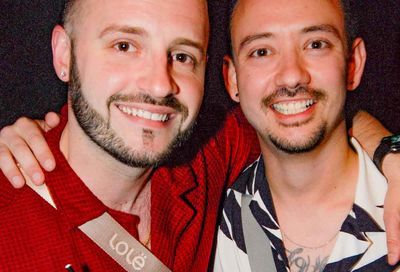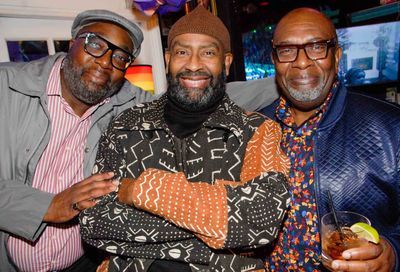Kahn Bravura!
The applause began when Michael Kahn joined the Shakespeare Theatre Company. Twenty-five years later, it's louder than ever.
MW: Strange Interlude isn’t staged very often. How important is it to the O’Neill canon?
KAHN: Well, to the O’Neill canon I think it is major, because it’s one of O’Neill’s great experimental forays into what the theater could do. So influenced by Joyce, influenced by Freud. He wrote it uncompromisingly. He wanted to do a complete story of a woman. What I think he did – and I think consciously now that I’ve worked on it – is that in telling the story of a woman, he is telling the story of America. Although it doesn’t seem to be about America in the way a play that is about America is about America. One of the inalienable rights of Americans is the pursuit of happiness. And the pursuit of happiness is what this play is about. Every character in this play is pursuing happiness and the American dream. It’s love, family, sex, fame, wealth. It’s all there. And work, work, work, and then fame. All the things that you think will make you happy is what this play is about. Telling it in the story of a woman and three men. And it’s very daring. There’s an abortion, there’s a ménage à trois, there’s all of these things. It was banned in Boston at the time. It must have been very shocking.
But it got to New York and won the Pulitzer Prize and made O’Neill rich. It ran for over 400 performances, which was unheard of then.
MW: Why did you choose to do it?
KAHN: I’ve always been fascinated by this play – by the form, by the story, by the challenge. Although I’d thought about doing this play for a long time, I just never had the opportunity and I made the opportunity this year. I said, ”Okay, the 25th anniversary and we’ve raised a little extra money.” I didn’t need money for sets and costumes or actors. I needed money for more rehearsal time and I got it.
MW: Are you nervous about the reception of something so experimental?
KAHN: Well, I don’t know if it seems experimental anymore. But this theater should not be here unless it’s willing to challenge itself. And just because it has a new theater and larger expenses and more things it has to worry about, it’s still got to be who it is, you know?
MW: Do you program a season with that in mind? Do you balance the risks with the hits?
KAHN: If I knew which ones the hits were, I should be in New York making a lot of money.
MW: Oh, c’mon, we know which ones are the hits….
KAHN: No, we don’t. It was a hit maybe in Shakespeare’s time, but now that everybody’s doing it, it’s not the same. I took over a Shakespeare theater – the Folger – that was about to close, so Shakespeare was not a hit then. Eventually Shakespeare became successful again, and then a lot of people were doing Shakespeare – and now people are doing Shakespeare without words. And a lot of people are going to that thinking they’re seeing Shakespeare.
MW: What do you think of the trend to take something like Shakespeare and turn it into a dance experience?
KAHN: Well, it’s a dance experience.
MW: But is it theater?
KAHN: It’s dance theater. Shakespeare without Shakespeare’s words are Shakespeare’s stories. And that’s fine. There’s nothing wrong with that. But to say that Synetic is doing Shakespeare is ridiculous. To say that Synetic is doing some wonderful theatrical things around a Shakespeare theme, that’s absolutely true. And when they do it well, it’s really wonderful. But it’s not Shakespeare.
But we support them. We let Synetic have a home at the Lansburgh. We help them out.
MW: It’s an alternative, isn’t it? If you’re familiar with Hamlet, for instance, it’s another way of looking at Hamlet.
KAHN: Totally. Absolutely.
MW: But, you’re right, Shakespeare is about the language in the purest form. When, as a director, you’re dealing with Shakespeare’s verse, and you drill down to each specific word and also have to evoke an emotional response from the actor – well, I’d think that’s a pretty tricky thing to do.
KAHN: That’s why I think acting Shakespeare is the hardest thing there is. You have to use pretty much everything you’ve got – your intelligence and your emotions and your physicality and your imagination and your technique. You have to have a voice that expresses different things. You have to have a body that goes along with what you’re feeling. You have to be able to transform. You’re within a musical form and you can’t think of it as music, you have to think about it as words coming from feelings. It’s the Olympics of acting really, acting Shakespeare. And it changes every 10 years. You can’t speak Shakespeare today the way John Gielgud did.
Support Metro Weekly’s Journalism
These are challenging times for news organizations. And yet it’s crucial we stay active and provide vital resources and information to both our local readers and the world. So won’t you please take a moment and consider supporting Metro Weekly with a membership? For as little as $5 a month, you can help ensure Metro Weekly magazine and MetroWeekly.com remain free, viable resources as we provide the best, most diverse, culturally-resonant LGBTQ coverage in both the D.C. region and around the world. Memberships come with exclusive perks and discounts, your own personal digital delivery of each week’s magazine (and an archive), access to our Member's Lounge when it launches this fall, and exclusive members-only items like Metro Weekly Membership Mugs and Tote Bags! Check out all our membership levels here and please join us today!




















